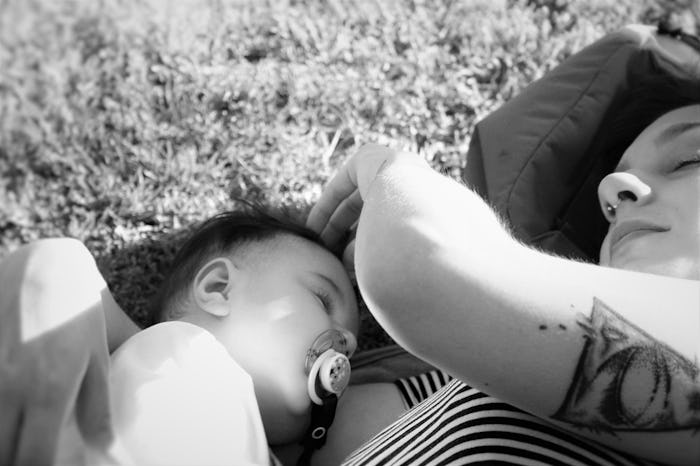Life post-baby is a bit unpredictable. Your recovery experieince might be different from your friends, family members, or even yours if it's your second time. Although each woman is different and no labor experience is the same, there are a few postpartum symptoms you shouldn't assumer are normal, even if they feel like something that just "happens" after you give birth.
Even though you're likely busy gawking at and snuggling with the newest addition of your family, remembering to pay attention to your own body's healing process is just as important — though not nearly as cute or fun. There is a fine line between a healthy recovery and a red flag, so knowing what to expect from your recovery period is important. These symptoms, although varying in severity, all signify that something isn't quite right with the way your body is handling birth, and they shouldn't be ignored.
This isn't a definitive list of "things that can go wrong after birth," but it is a few of the most common dangerous symptoms. If you do notice any of these symptoms, or something else that seems off, call your OB-GYN to determine whether you need to go into see them sooner than your postpartum check up.
1A Persistent Headache That Doesn't Go Away
Although having a headache after birth is quite normal, especially after you've had an epidural, if it doesn't go away within 24 hours, something might be up. According to Very Well, a persistent headache postpartum may be a sign of preeclampsia or even more rarely, meningitis or hemorrhage. In the majority of cases, a little water and an ibuprofen should cure your post-labor migraine, but if it doesn't subside on it's own, call your doctor.
2Extreme Blood Loss
Of course, blood loss is totally normal after giving birth. But how much is too much? According to the Mayo Clinic, you will bleed heavily the first few days after giving birth and will likely need a hospital grade pad. After that, the bleeding should go down drastically and consistently. If it doesn't decrease or if it increases, the Mayo Clinic instructed moms to visit their OB right away as it could be a sign of a retained placenta or other infection.
3Depression
Depression, although fairly common, is not a "normal" symptom that should be left untreated. The American Pregnancy Association (APA) noted that there are typically three categories of postpartum mood disorders: the "baby blues," postpartum depression (PPD,) and postpartum psychosis (PPP.) Postpartum anxiety and postpartum post-traumatic stress disorder are also on the list.
According to the APA, 50 to 75 percent of moms will experience the baby blues (general negative feelings and the least severe form of postpartum depression,) at some point after giving birth. However, the baby blues usually resolve on their own within two to three weeks. Postpartum depression, on the other hand, affects around 15 percent of mothers and can appear one day to a year after giving birth. The feelings are more severe and can last for longer than two weeks. If you think your symptoms are indicative of PPD or one of the other disorders, see your OB for advice on next steps. No mom should have to handle PPD alone.
4High Blood Pressure
According to the aforementioned Mayo Clinic article, high blood pressure and excess protein in the urine after giving birth is indicative of a rare but serious condition called postpartum preeclampsia. It usually develops within 48 hours of delivery, but sometimes doesn't show up until six weeks or so after birth. Postpartum preeclampsia must be treated right away which is why doctors are careful to keep an eye on your blood pressure before sending you home.
5High Fever
Baby Center noted that even a low grade fever can be dangerous after birth, as it is usually a symptom of an infection. According to the National Institutes of Health, a postpartum fever is usually indicative of endometriosis, but can also be caused by a urinary tract infection, or an infection from an injury during labor.
6Severe Or Persistent Abdominal Pain
Abdominal cramping and mild pain is normal and healthy after birth, but if your abdominal pain doesn't go away or worsens, Baby Center noted that you should see your OB to rule out infection.
7Swelling Or Tenderness In Your Leg
Mild swelling in your legs, ankles, or fingers is referred to as postpartum edema, and will resolve itself on its own. However, if the swelling doesn't go away within a week or worsens, it could be a symptom of high blood pressure, Baby Center noted. Similarly, you should call a doctor immediately if the swelling is only in one leg and is accompanied by severe pain, as it could be a symptom of deep vein thrombosis.
